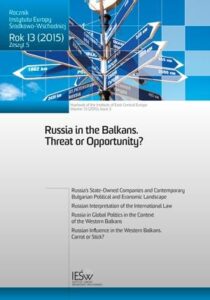Russia’s State-Owned Companies and Contemporary Bulgarian Political and Economic Landscape
Liczba wyświetleń: 1452
The paper represents and attempt to link energy projects of government companies of the Russian Federation with nowadays Bulgaria’s political and economic environment. It focuses on the last ten years and gives deeper historical background (e.g. Bulgaria defaults on its foreign debt to Soviet banks, nuclear projects of the Communist era, etc.) only when relevant for the understanding of the contemporary situation. The first section of the paper summarizes a 2002-2015 energy project in its controversial policy environment. The second section explains the impacts on Bulgarian power sector policies, especially delays in its liberalisation, controversies around EU policies related to renewable energy and environment policies, plus public and political attitudes towards FDI’s and energy resources. The power sector policies have had negative side-effects on the country’s banking sector, a bank run and a bankruptcy of one bank in 2014; this experience is reviewed in the third section of the paper. The forth part describes the impacts on Bulgaria’s political establishment in 2007-2014, and attempts, instead of conclusion, a description of peculiarities of the contemporary Russia-Bulgaria controversies. The paper uses several documents and sources that are almost unknown to the international audience.


